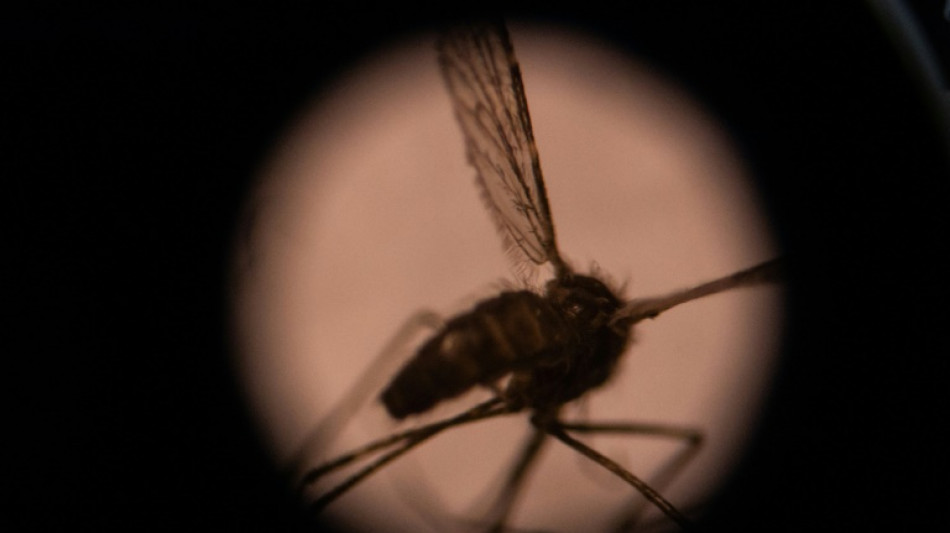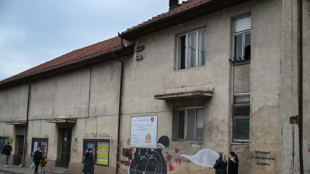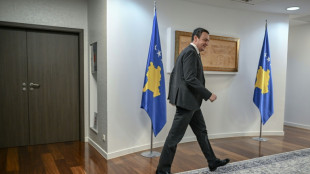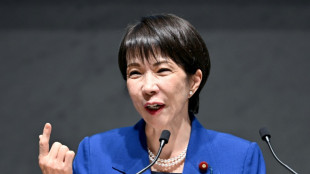
-
 Man Utd made to 'suffer' for Newcastle win, says Amorim
Man Utd made to 'suffer' for Newcastle win, says Amorim
-
Morocco made to wait for Cup of Nations knockout place after Egypt advance

-
 Key NFL week has playoff spots, byes and seeds at stake
Key NFL week has playoff spots, byes and seeds at stake
-
Morocco forced to wait for AFCON knockout place after Mali draw

-
 Dorgu delivers winner for depleted Man Utd against Newcastle
Dorgu delivers winner for depleted Man Utd against Newcastle
-
US stocks edge lower from records as precious metals surge

-
 Somalia denounces Israeli recognition of Somaliland
Somalia denounces Israeli recognition of Somaliland
-
The Cure guitarist and keyboard player Perry Bamonte dies aged 65

-
 Draper to miss Australian Open
Draper to miss Australian Open
-
Police arrest suspect after man stabs 3 women in Paris metro

-
 Former Montpellier coach Gasset dies at 72
Former Montpellier coach Gasset dies at 72
-
Trump's Christmas gospel: bombs, blessings and blame

-
 Russia lashes out at Zelensky ahead of new Trump meeting on Ukraine plan
Russia lashes out at Zelensky ahead of new Trump meeting on Ukraine plan
-
Salah helps Egypt beat South Africa and book last-16 place

-
 Australia's Ikitau facing lengthy lay-off after shoulder injury
Australia's Ikitau facing lengthy lay-off after shoulder injury
-
Another 1,100 refugees cross into Mauritania from Mali: UN

-
 Guardiola proud of Man City players' response to weighty issues
Guardiola proud of Man City players' response to weighty issues
-
Deadly blast hits mosque in Alawite area of Syria's Homs

-
 The Jukebox Man on song as Redknapp records 'dream' King George win
The Jukebox Man on song as Redknapp records 'dream' King George win
-
Liverpool boss Slot says Ekitike reaping rewards for greater physicality

-
 Judge jails ex-Malaysian PM Najib for 15 more years after new graft conviction
Judge jails ex-Malaysian PM Najib for 15 more years after new graft conviction
-
Musona rescues Zimbabwe in AFCON draw with Angola

-
 Zelensky to meet Trump in Florida on Sunday
Zelensky to meet Trump in Florida on Sunday
-
'Personality' the key for Celtic boss Nancy when it comes to new signings

-
 Arteta eager to avoid repeat of Rice red card against Brighton
Arteta eager to avoid repeat of Rice red card against Brighton
-
Nigeria signals more strikes likely in 'joint' US operations

-
 Malaysia's former PM Najib convicted in 1MDB graft trial
Malaysia's former PM Najib convicted in 1MDB graft trial
-
Elusive wild cat feared extinct rediscovered in Thailand

-
 Japan govt approves record budget, including for defence
Japan govt approves record budget, including for defence
-
Seoul to ease access to North Korean newspaper

-
 History-maker Tongue wants more of the same from England attack
History-maker Tongue wants more of the same from England attack
-
Australia lead England by 46 after 20 wickets fall on crazy day at MCG

-
 Asia markets edge up as precious metals surge
Asia markets edge up as precious metals surge
-
Twenty wickets fall on day one as Australia gain edge in 4th Ashes Test

-
 'No winner': Kosovo snap poll unlikely to end damaging deadlock
'No winner': Kosovo snap poll unlikely to end damaging deadlock
-
Culture being strangled by Kosovo's political crisis

-
 Main contenders in Kosovo's snap election
Main contenders in Kosovo's snap election
-
Australia all out for 152 as England take charge of 4th Ashes Test

-
 Boys recount 'torment' at hands of armed rebels in DR Congo
Boys recount 'torment' at hands of armed rebels in DR Congo
-
Inside Chernobyl, Ukraine scrambles to repair radiation shield

-
 Bondi victims honoured as Sydney-Hobart race sets sail
Bondi victims honoured as Sydney-Hobart race sets sail
-
North Korea's Kim orders factories to make more missiles in 2026

-
 Palladino's Atalanta on the up as Serie A leaders Inter visit
Palladino's Atalanta on the up as Serie A leaders Inter visit
-
Hooked on the claw: how crane games conquered Japan's arcades

-
 Shanghai's elderly waltz back to the past at lunchtime dance halls
Shanghai's elderly waltz back to the past at lunchtime dance halls
-
Japan govt approves record 122 trillion yen budget

-
 US launches Christmas Day strikes on IS targets in Nigeria
US launches Christmas Day strikes on IS targets in Nigeria
-
Australia reeling on 72-4 at lunch as England strike in 4th Ashes Test

-
 Too hot to handle? Searing heat looming over 2026 World Cup
Too hot to handle? Searing heat looming over 2026 World Cup
-
Packers clinch NFL playoff spot as Lions lose to Vikings


Fanning mistrust on health, Russia seeks foothold in West Africa
"Health and Sovereignty" was the theme. The conference on December 22, 2023, in Burkina Faso's capital Ouagadougou brought together researchers and naturopathic practitioners from several West African countries who praised the possibilities of traditional plants.
In the predominantly African crowd, one speaker stood out. Denis Degterev, a former diplomat and professor of international relations theory in Moscow.
"Medical sovereignty is one of the multifaceted parts of sovereignty and Russia wants to help African countries advance it," he said in French to the Burkina24 network at the conference, where some wore stickers of the Russian and Burkina Faso flags.
Sovereignty has been the buzzword for the military rulers in the nation which experienced two coups in 2022. The junta, like those in Mali and Niger, has turned to Russia after loudly rejecting support from former colonial power France in their long-running battles against jihadists.
Russia has increasingly eyed distrust of Western public health efforts as a way to boost its influence. According to the United States, Russia has launched a full-scale disinformation effort in Burkina Faso, Mali and elsewhere in West Africa, including by promoting conspiracy theories on social media and recruiting local online influencers.
After the conference in Ouagadougou, a statement in the name of a civil society group in the country's Hauts-Bassins region blamed the Western colonial legacy for "African nations' total dependence on the pharmaceutical industry" and on international assistance.
- Targeting malaria work -
One group that has been especially in the sights of social media accounts has been Target Malaria, a not-for-profit international research consortium that is working to fight malaria, a mosquito-borne disease that kills more than 600,000 people each year, mostly young children in Africa.
Target Malaria, whose main financial supporter is the Bill and Melinda Gates Foundation, has worked since 2012 in Burkina Faso with the approval of authorities.
Target Malaria is seeking to use genetic technologies to control malaria. In 2022, the group imported into Burkina Faso genetically modified mosquitoes developed in a laboratory at Imperial College London and bred in Italy that will breed primarily male offspring. Only female mosquitoes bite humans and transmit malaria.
Social media postings and comments from influencers attacked Target Malaria last year over an epidemic of another mosquito-spread disease, dengue fever, which killed nearly 600 people in Burkina Faso.
The research institute working with Target Malaria in Burkina Faso's second city Bobo Dioulasso, capital of the Hauts-Bassins region, rejected any link between the anti-malaria modifications and dengue fever, calling the allegations "false" and "deeply regrettable".
While attention has ebbed following the dengue outbreak, which is seasonal, some activists have kept up the cause.
Nestor Podasse, an activist in Burkina Faso critical of foreign influence, in a Facebook post said the research was "used by the Americans to create biological weapons" but praised Russia for sending doctors to work against dengue fever.
The Gates Foundation denied its anti-malaria research was aimed at creating biological weapons.
Among the influencers has been Egountchi Behanzin, a French activist of Togolese origin with more than 300,000 Facebook followers. In October, he began posting videos alleging a link between Target Malaria and dengue fever.
- US sees Russian interests -
The United States, a geopolitical adversary of Russia which closely follows Moscow's information efforts, said it has traced the effort back to Russia.
James Rubin, special envoy and coordinator of the State Department's Global Engagement Center, which tracks foreign disinformation, said Russia was seeking in Africa to solidify support and increase distrust of the West.
He said Moscow had failing to make greater traction in Europe following its invasion of Ukraine, including with a debunked story of Kyiv developing biological weapons with US support.
Russians expelled from embassies in Europe or who worked for state-backed Russia Today "didn't go home. They've been redeployed to Latin America and to Africa," Rubin told AFP.
The State Department said Russia's "African Initiative" has used both branded and unbranded social media accounts to push disinformation and has set up offices both in Ouagadougou and Mali's capital Bamako.
The State Department said the chief editor is Artem Kureyev, who heads another organisation publicly registered in Moscow, and pointed to a channel on the Telegram social media service that promotes African Initiative content.
Russia's embassy in Washington rejected the accusations, saying the United States was trying to "intimidate" countries that value cooperation with Russia.
But Rubin said Russia had a long track record of disinformation on public health, pointing to Cold War-era stories seeking to link the HIV/AIDS crisis to the United States.
"It's a particularly egregious action for Russia to take, because you can draw a straight line between Russian disinformation and the killing of Africans," he said.
He said that an earlier US effort to expose health disinformation in Latin America has proven successful, with Russia not expanding efforts there.
"We are trying to inoculate the populations of Africa -- especially the elites, the journalists, the governments, the civil society -- who would be the first to see these stories, so that they know it's got a made-in-the-Kremlin stamp on it and they don't get misled," Rubin said.
burs-pid-sct/bp
Y.Aukaiv--AMWN



